| Reviews & Columns |
|
Reviews DVD TV on DVD Blu-ray 4K UHD International DVDs In Theaters Reviews by Studio Video Games Features Collector Series DVDs Easter Egg Database Interviews DVD Talk Radio Feature Articles Columns Anime Talk DVD Savant Horror DVDs The M.O.D. Squad Art House HD Talk Silent DVD
|
DVD Talk Forum |
|
|
| Resources |
|
DVD Price Search Customer Service #'s RCE Info Links |
|
Columns
|
|
|
Four Lovers
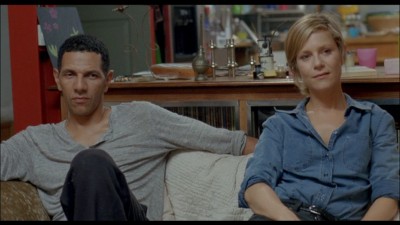
Antony Cordier's Four Lovers is a film about two married couples who entice one another into swinging, but it aspires to be one that couldn't just be reductively described in those terms; the intention is obviously to go for the deeper emotional and interpersonal dimensions beyond just the renewed physical vigor that might enter into such an arrangement, to depict the repercussions in the participants' hearts and on their lives. That is a legitimate and worthwhile idea, and the filmmakers, whatever else one can say of them, are clearly not telling this story out of any prurient or exploitative motivation; their intriguing project is evidently to bring to the story an explicitness about the varying emotional temperatures and logistical complications involved that is equal to their explicitness when it comes to the different sexual needs and fulfillments depicted. Unfortunately, though -- and however commendable and ambitious the intention to duly encompass the above- and below-waist implications of such an arrangement -- the film is too ambitious and too tasteful for its own good.
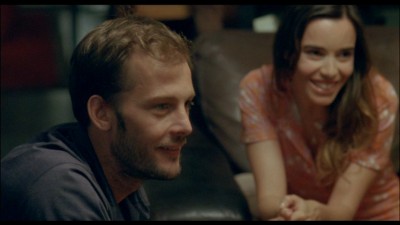
Tasteful film, tasteful people: it wouldn't be fair at all to deny that bourgeois bohemians have common feelings, doubts, and desires that are as worthy as anyone's of dramatic representation (that's why I'm never down with the way of thinking that wants to deny Bergman's films their power because they usually deal with upper-middle-class intellectuals), but not least among Four Lovers's deflating contrivances is the sitcom assemblage of midlife-career avatars it's assembled for the sexually adventurous protagonists: There's Rachel (Marina Foïs), who's setting up her craftsy jewelry boutique with a website; her husband, Franck (Roschdy Zem), a massage therapist/author; Vincent (Nicolas Duvauchelle, Isabelle Huppert's son in White Material), the flirty IT guy Rachel has hired to create her Web presence; and Vincent's wife, Teri (Élodie Bouchez, Wild Reeds), a former gymnast who once competed in the Seoul Olympics. Franck is, it appears, of Algerian descent, and there is a brief, dramatically intense sequence where we see the "HLM" (public housing high-rise) his parents still live in, suggesting a connection between at least one of the leads and a world outside the shabby-chic insularity of these four lovers' lives. But that hint of further, fruitful contrast is never developed; we spend most of the film buried deep inside what looks to be a catalog for a life of gracious contemporary family living and an attempt at equally gracious polyamory. (The bad adult-contemporary-"alternative" music on the soundtrack, thankfully kept to a minimum, doesn't help the creeping feeling that one is watching an advertisement for asininity.)
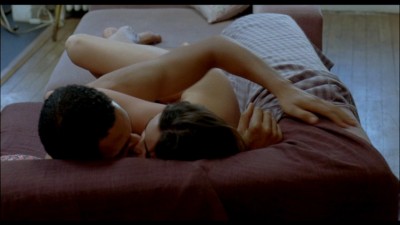
It's not that this finally too-enclosed, airless film lacks for depictions of fresh air: After the initial spark we see between Rachel and Nicolas while working together, as the four urbanites have their get-togethers with homemade gourmet meals and wine, flirt with one another, and eventually set up a nonchalant, sexy arrangement of "who's going home with whom this evening" and shared vacations that seems to be free of jealousy or pettiness, the film travels from prettily shot interiors to some truly lovely pastoral settings, where the two couples smoke marijuana and lounge and eat and drink and swim and make love in an idyll that suggests the film could've worked as a not highly original but well-done sort of parable about the city/country, tension/relaxation, cerebral/physical dichotomies; running the gamut from scenes set on city streets to those taking place in racquetball clubs, in gardens, in kitchens, amid a wide-open field or on the shore of a lake, the cinematography (most often handheld, but not in the forced, overly shaky way) by Nicolas Gaurin heightens the gorgeousness and/or down-to-earth quality of life anywhere he shoots it: natural light is used beautifully, and the film's world seems gauzy, elemental yet gentle at the same time.
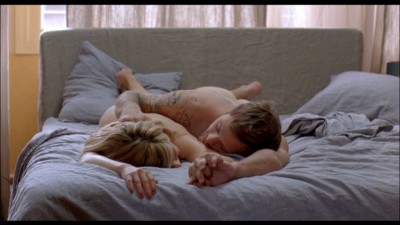
But, sad to say, what would've worked for a deceptively mild-mannered, actually expansive, probing-but-compassionate Renoir-esque pastoral doesn't work for much of where the film actually goes, which is, paradoxically, perhaps a more emotionally "realistic" place, but one where the film's potential impact is heavily muted by factors even beyond the self-regarding coziness of its characters' circumstances and Gaurin's lyrical but ultimately ill-suited capturing of everyday light and color: There's a somewhat overwritten, overelaborated, too-convenient quality infesting the circumstances that at first seems fairly unbelievable on the film's own more or less realist terms, and then is revealed to be even less credible when some unnecessary and silly Dangerous Liaisons-type dramatics are retrospectively introduced in the third act. By the time the film arrives at what, thanks once more to its lovely visual quality, looks like a melancholy, tender conclusion, we can no longer believe it. This reviewer is not remotely a stickler for objective "plausibility," and you will rarely hear me complain that what occurred, or how, in a film "wasn't 'realistic.'" My view is that the best any film can do is to intuit its own (hopefully sharp and imaginative) internal logic and adhere to it as best (or, in some cases, as magnificently and movingly) as possible. And that's just where the unrealistic quality of Four Lovers is a problem the film can't surmount: it's all played quite realistically, and the actors are very good to excellent throughout, but in the end it's no more or less than an erotic movie that, while shamelessly using implausible ruses perfectly acceptable in erotica or pornography, feels the need to pass itself off as more simultaneously sensitive, perceptive, grounded, and earthy than it really is; it wants to be too many things at once, and it can't be all of them convincingly. (Take note: This, not the mere presence of challenging degree of intellectual or aesthetic ambition, is what the abused-to-death word "pretentious" actually means.) The story is melodramatic, the tone is naturalistic, and each of those two ill-matched modes only reveals flaws in the other that a more decisive, better-controlled approach might have rendered irrelevant.
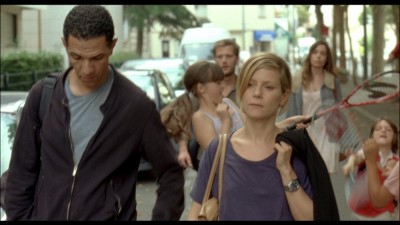
That leaves the uncomfortable impression that Four Lovers is too much and not enough; it has too many pieces to its high-minded ambitions that don't fit (even if that's because they're artificially made to fit oh-so-smoothly). I feel like Pauline Kael asking this, and her attitudes are generally not ones I share, but: Would it have been so wrong to make Four Lovers a self-consciously arousing movie about beautiful, well-off people finding ways to shake off stress and routine by having creative, hot, novel sex with each other? It's visually impressive throughout, and it is when it indulges in eroticism and just the sheer sensuality of what can be done on celluloid with the human form and the nature surrounding it that the film is at its best; it's the laudably conceived but not very well realized cerebral dimension that gets in the way, suggesting it should have either been better integrated or left out altogether. The provocative questions the film might have raised, the emotional impact it might have made, could have arisen from a stunning depiction (however unrealistic, however much a joyous fantasy) of people who are, at least for a while, unusually, naively free (the film's original French release title, also in English for some curious reason, was Happy Few). But Four Lovers is made up of moods and attitudes both dramatic and visual/aural that don't mesh well, instead turning in on and against themselves and leaving its least convincing, most tiresome bits starkly prominent and turning its best, most beautiful ones into nothing more than wispy pleasantries.
THE DVD:
Four Lovers is presented anamorphically at its original aspect ratio of 1.85:1 in a transfer that's extraordinarily well-done; every bit of color, light, shadow, and skin tone has been well taken care of and look brilliant, while the celluloid texture that helps make the film look so good (whatever its other shortcomings) has been kept fully intact.
Sound:The disc offers a choice between Dolby Digital 2.0 Stereo and 5.1 Surround tracks (in French with optional English subtitles), both of which are perfectly clear, full, and minus any audio flaws whatsoever.
Extras:--Most of the 16 minutes of deleted scenes were either cut out fairly reasonably (unnecessary exposition, redundancy, etc..) or with very good reason (a horrible bit about a missing cat that would have been more suited to Antichrist and would have destroyed, without helping, this film's tone of blasé pleasantry; and an ill-advised, faltering attempt to massage what in the final cut is barely noticeable, passively quasi-homophobic overcaution, by having the two men casually broach and just as casually reject, immediately, the same-sex experimentation their wives have very readily explored for what, you can be certain without checking, is a straight male's eye on the world). The omissions, as usual in this context, are still worth a glance for those interested in filmmaking, who may want to get a better idea of what process the shaping of the film took in the editing room.
--The film's theatrical trailer, along with an assortment of other trailers for more interesting Oscilloscope releases like Meek's Cutoff and The Law.
--Two (public domain?) educational shorts, ostensibly from "The Oscilloscope Vaults": Who's Right? (1950, 18 min.) and Jealousy (1954, 16 min.), both based on some popular manual of the time called Marriage for Moderns (probably published by Houghton-Mifflin, the firm that produced the films). The reason they're included would seem to be to point up how much more sophisticated we've become in our culture and our lives since the 1950s, with Four Lovers as the positive contrast. But, though they're just as hammy and silly and dated as you might expect, with the bad acting, contrived scripts, and smarmy narration providing bountiful cause for mirth, they're unintentionally richer than the feature. I think it's because, as technically incompetent and ugly as they are compared to Four Lovers, they say more of consequence about their era (however unpleasant; if you happen to have that ill-informed conservative nostalgia for the '50s as some sort of Technicolor family-values-fest, it couldn't hurt you to see how grim the underpinnings, and these "right-thinking" specimens show off the nightmarishness of Eisenhower-era gender relations and expectations in all their hideousness) than does the main film which, as already mentioned, seems somehow complacent and insular by comparison.
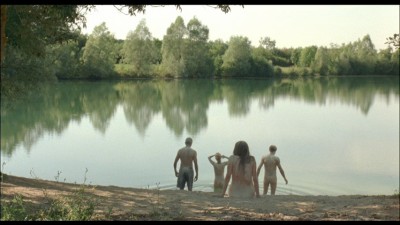
Four Lovers is a pleasant and well-meaning film, but one gets the impression, with its pensive, impeccably executed style and aura, that it means to be more, and that is where it falls short. It's not even that writer/director Antony Cordier and his collaborators in preparing and shooting the film have neglected to sufficiently cover the potential complications that might arise when two married couples decide to bed-hop; it's just that they've done it through a lens of finely-wrought, pretty, but not quite fitting cinematography, composition, and editing that, however invested their clearly talented (and therefore somewhat wasted) cast might be in exploring the vacillations and ambivalences of such a situation, can't help making too many moments feel like a commercial. Worse, so desultory is the touch that was surely meant to be "light," free, and nonjudgmental, one can't be sure whether the ad is for open relationships, the summer vacation property where the sexiest explorations take place, or whatever fabric softener the couples might be using for their drapes and bedding. Like Tom Tykwer's 3, Four Lovers is a noble attempt to open our minds and broaden our conceptions of sexual liberation via dramatic narrative that, while not a total failure, never really gels into something that makes a mark. Instead, it's a nice-enough, contrived, not very surefooted half-success that, while worth a look, could not be considered vital or essential in any way. Rent It.
|
| Popular Reviews |
| Sponsored Links |
|
|
| Sponsored Links |
|
|
| Release List | Reviews | Shop | Newsletter | Forum | DVD Giveaways | Blu-Ray | Advertise |
|
Copyright 2024 DVDTalk.com All Rights Reserved. Legal Info, Privacy Policy, Terms of Use,
Manage Preferences,
Your Privacy Choices | |||||||















